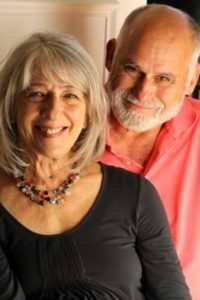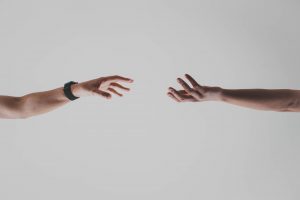Pauly's Story - Part 1 from Walk and Talk on Vimeo.
Note: Below is a transcription of this Walking Our Talk podcast. Please excuse any grammatical or punctuation flaws, as the transcription is a written version of our fluid conversation.
Pauly [00:00:07] Welcome to walking our talk with Alan and Pauly Heller, join our conversation as we discuss practical ways to apply spiritual principles to your everyday life and help you walk your talk one step at a time.
Alan [00:00:27] Welcome to Walking Our Talk. This is Alan Heller and we’re connecting people with God and each other and I just thought I’d connect with my wife here today.
Pauly [00:00:37] Hello.
Alan [00:00:38] And we’re going to do something a little different today. We’re going to be letting Pauly tell her story, which is pretty, just a radical. A radical, I’m trying to think of the words, you know, you were saved radically is what I try.
Pauly [00:00:57] Yes, yeah.
Alan [00:00:59] And you so start at the very beginning, not when you were born, but where were you born. And tell us a little bit about how you grew up.
Pauly [00:01:09] OK, well, I grew up in southwestern Pennsylvania in a Jewish family that was pretty traditionally Jewish in terms of conservative, the conservative branch of Judaism.
Alan [00:01:28] You got three different kinds, and one is Orthodox, which is very religious. You have conservative, which is pretty religious. And in your family, the center of warmth really was the Jewish community center. Everything revolved around that.
Pauly [00:01:42] Right.
Alan [00:01:42] My family, we were reform. And I say we celebrate Christmas and Hanukkah and the best of both holidays.
Pauly [00:01:50] Well, the synagogue that I went to was conservative, but also had formerly been orthodox. And so. So, yeah. So we had Orthodox people, as well as conservative Jewish people in our congregation. My grandmother kept kosher. One of my grandmothers did.
Alan [00:02:16] And for those who may not know what kosher means. Tell them what’s it is.
Pauly [00:02:18] So kosher is that the Jewish dietary laws that have to do with how meat, how animals are slaughtered, draining out all of the blood, not eating certain meats, obviously nothing from a pig. And so no pork or ham or shellfish, certain foods like that. And even not mixing meat with milk like my dad snuck me out to get my first cheeseburger when I was in high school, but lightning struck, right? No, no, but we didn’t eat it in our house, OK? So I loved the synagogue, I loved our rabbi. When I was in fifth grade, a new rabbi came to town, the old rabbi had retired or moved on, and this rabbi kind of took our class of kids under his wing and spent a lot of time teaching us about our Jewish heritage. We learned lots of Jewish prayers and read Hebrew and learned how we would conduct ourselves in the synagogue and how to how to do a traditional service. So I really took my Judaism seriously.
Alan [00:03:57] So serious, I heard that you had an aspiration to be the first Jewish rabbi woman, a woman rabbi.
Pauly [00:04:06] Yes, there was that point. There weren’t any then, but there are now.
Alan [00:04:12] So you loved your Jewishness?
Pauly [00:04:14] I did. I did. And also another part of that is that my mother was born in Vienna and came to the United States when she was 14 years old in 1938, just before Kristallnacht, just before things got really bad in Europe.
Alan [00:04:34] And in terms of the Nazis?
Pauly [00:04:37] In terms of the Nazis and people take it for granted. People understand what I’m talking about. But being Jewish was very important to me, it was the center of our religious life, but it was also a huge part of our social identity as well, because my parents, along with a lot of other baby boomer parents, formed the Jewish Community Center and purchased a property where they ran a nursery school and had social events and eventually built a swimming pool because the country club did not allow Jewish people.
Alan [00:05:38] So that’s anti-semitism.
Pauly [00:05:38] Yeah, in their country club, to play golf on their golf course or to swim in their swimming pool. There just was a certain amount of anti-Semitism in the town. People didn’t Jewish people didn’t serve on elected positions, but were still very successful merchants, business people.
Alan [00:06:04] What did your dad do?
Pauly [00:06:05] My dad was in life insurance and he eventually became this district manager for his company. And he was also a chartered life underwriter, helped people set up their retirement funds and all of that kind of thing. And I love my family and I loved our Jewish community. There wasn’t a whole lot about being Jewish that I did not love. You know, it was just a great way to grow up. I had a really strong social circle of other kids. My other social circle, though, was from dancing school because I started taking dancing lessons.
Alan [00:06:51] And what kind of dance are you talking about?
Pauly [00:06:53] Um, tap, acrobatic jazz, ballet, things that my mother started doing and dance when I was three because I had a little toe in and was always tripping over my feet.
Alan [00:07:10] And she was also keeping you out of trouble??
Pauly [00:07:14] Not at three, she was just trying to help me become aware of where my feet were. And so I, I learned along with walking how to do cartwheels and forward rolls and eventually handsprings. And, you know, by the time I was in high school, I could hold a handstand longer than anybody else in the dancing.
Alan [00:07:43] So. And know you were on the Ted Mack amateur.
Pauly [00:07:46] Oh, yeah.
Alan [00:07:47] The Steel Pier. And then we’ll move on from there.
Pauly [00:07:51] All right. So the reason I mention that is because the type of dance that I enjoyed didn’t lend itself in my mind to something that I could continue after high school graduation. So but I was good at acrobatics and gymnastics was something that was just starting to become popular. It was. It was, yeah. Cathy Rigby. Maybe when we’re all good. Corbett And but it was actually even before that, like Linda Matheney, nobody and know nobody knows these gymnasts names anymore. But I had read an article in Life magazine about a gymnast named Kathy Corrigan who went to a school in Massachusetts called Springfield College. And so I applied to go to college at Springfield College and got accepted there and tried out for gymnastics.
Alan [00:08:59] What was your major?
Pauly [00:09:01] I didn’t really have a major to start, but I ended up as an English major and my best friend in college was Kathy Corrigan’s sister, Patty. And Patty and I used to party a lot. And in fact, we partied so much that it came to the attention of the gymnastics coach who decided that I was a bad influence on Patty. And Patty was the one who took me out of the library to go drinking with her.
Alan [00:09:37] But you ended up getting kicked off the team.
 Pauly [00:09:38] But I ended up getting kicked off the gymnastics team my sophomore year. And because I had so much time on my hands that year, and it was the middle of Vietnam, the middle of black power. This is where black people went from being Negroes to being black or Afro-American and I had a black roommate and for the first time in my life was becoming aware of some of the issues that black people encountered. There was a certain amount of unrest on our small campus, and I became part of a group that took over the administration building. We staged a sit-in.
Pauly [00:09:38] But I ended up getting kicked off the gymnastics team my sophomore year. And because I had so much time on my hands that year, and it was the middle of Vietnam, the middle of black power. This is where black people went from being Negroes to being black or Afro-American and I had a black roommate and for the first time in my life was becoming aware of some of the issues that black people encountered. There was a certain amount of unrest on our small campus, and I became part of a group that took over the administration building. We staged a sit-in.
Alan [00:10:31] This shock most people that know, you know. You wore wire-rimmed glasses and bib overalls and hiking boots and curse like a sailor and nobody thinks that you right now.
Pauly [00:10:42] Right. Right. So I was part of this group that locked the doors of the administration building.
Alan [00:10:51] How are you feeling at this time? And where was your this Jewish heritage and God? Well, what part did you play?
Pauly [00:10:59] Well, at that point, going to a school that had very, very few Jewish students.
Alan [00:11:06] Right. In the YMCA school. Yeah. Mind and body. Although the spirit I thought left a long time ago.
Pauly [00:11:13] Right. Well, that’s where I met you because you went to Springfield College as well. And we’re also on the gymnastics team.
Alan [00:11:21] But we were not a thing.
Pauly [00:11:23] No, not then. But I did go to the synagogue, my very first high holidays, the fall of my freshman year. So I guess so Rosh Hashanah, Yom Kippur, the high holy days that take place in the fall. I went to an Orthodox synagogue hoping to find God. They’re hoping to find something that was really meaningful, more may be more meaningful than what I had been experiencing since I had passed the age where all the boys were bar mitzvah, and at 13, at 13, you become a man at 13. Yeah.
Alan [00:12:15] Whether you like it or not.
Pauly [00:12:16] And at that point in my life, the religious education kind of stopped and dancing school kind of took over. And I was also a cheerleader. So on Friday nights where I would usually be at the synagogue now, I was at football games and basketball games. And on Saturday morning when I might have gone to the synagogue, I was in dancing school.
Alan [00:12:43] So that didn’t last. And so when you went to college, you ended up going to this orthodox place, hoping that you’d get a really great experience. What happened?
Pauly [00:12:54] Well, the men sat on one side and the women sat on the other side, which was traditional in orthodox circles. And the men were up in the front reciting all of their prayers. And where I was in the back with the women, the women weren’t even paying any attention. They were sitting there talking to one another.
Alan [00:13:17] And so what did you think?
Pauly [00:13:20] I felt very disappointed. Like this is an Orthodox synagogue? This is what happens in Orthodox circles? The women just sit in the back and talk and aren’t even engaged in their religious life?
Alan [00:13:36] So, where did you go from there after that service?
Pauly [00:13:39] Well, I just kind of dropped everything in terms of trying to practice Judaism. It wasn’t that I renounced or denied my Judaism. It just kind of fell to the wayside. And in the meantime, I started doing a lot of drinking and smoking cigarets, smoking marijuana, smoking hash like I was I had gotten into what was happening in the late 60s.
Alan [00:14:08] And you were also pretty depressed or not?
Pauly [00:14:10] Yeah, no, not yet. I, I was enjoying my life of partying. But then the following year when I was kicked off the gymnastics team, that was a wake up call. Like I, I wanted to leave school. I wanted to go back home, I wanted to transfer, do something else. And my mother said, unless you know what you want to do, you just stay right where you are and work it out. And so that was when I ended up getting socially involved and became part of this group that took over the administration building. And then I got arrested. The police came carted all 18 or 20 of us off in a paddy wagon. I spent a night in jail.
Alan [00:14:59] Yeah. And tell them what your father said when you were on the phone with the one phone call?
Pauly [00:15:04] Yes, I was allowed one phone call. And actually, my father ended up saying to me that if he had been in my shoes, he probably would have done the same thing. And my mother was more upset that day because my sister had tried out for cheerleading and had gotten cut from the cheerleading squad from the tryouts. So I was kind of left to just work it out on my own and figure out how I was going to live in college after. Falling from this place of sort of privilege and enjoying all of my life now, I was kicked out of school when my friends bailed me out of jail, I didn’t even know what they had to pay for bail. But the dean of students decided that everybody who was involved in this takeover was we weren’t completely dismissed, but we were not allowed on campus for three or four days. And eventually, we had to stand trial.
Alan [00:16:29] Honey, that whole it’s the turning point in your life.
Pauly [00:16:32] Well, that was I think that was a turning point that just started me on a real downhill slide a year, I think. And it just got worse and worse till I graduated from college. Eventually, I got back into the good graces of the coach and I was allowed back on the gymnastics team and I competed and I did well in gymnastics, but I lived a couple of different lives. I had different identities. I had like a gymnastics team, my gymnastics team identity, my hippie pot-smoking identity, my drinking buddies identity, and then the need to perform. I still graduated magna cum laude. I still had to stay at the top of my class.
Pauly [00:17:32] But by the time I did graduate and I graduated early because I had skipped a year of school when I was in third grade. So I was I had barely turned twenty one when I graduated and I was only twenty when I was doing my student teaching. And I taught English to high school students, some of whom were only two years younger than I was a little different. And they were trying to tell me that I needed to grow up, that I was too much like them, that I was still actually like a kid. And I felt very, very lost and very depressed.
Alan [00:18:10] So we’re probably not going to be able to get all the way through the story in this podcast. So stay tuned for the next one. But you have a couple of minutes. So, OK, tell us when something changed in your life and you got out of the dope smoking, pot smoking.
Pauly [00:18:27] Well, in between my junior and senior years of college, a friend of mine was part of the Penn State men’s gymnastics team and the Penn State coach, the assistant coach, Ed Izabel, was starting a gymnastics camp in Pennsylvania. And through this relationship, he hired me. And so I worked at his camp that summer after my junior year. And it was fun. It was a new thing. But a lot of the gymnasts then and I know people have a hard time believing this, but it was there were a lot of hippie gymnasts, so there was a lot of partying and drinking and drugs and but all very recreational, a lot of fun, but after I graduated from college, I went back to that camp and worked for Ed Izabel again, and in the interim, Ed’s wife, B.G., which stands for Barbara. She had become a Christian and I lived with them and worked at that camp. And there was such an incredible change in BG’s life that I was drawn to this person who before had been kind of aloof and artsy and now, whatever it was, she was just love, she just radiated love, and she gave all the credit for this love to Jesus and all she wanted to talk about was Jesus.
Alan [00:20:29] So what we’re going to do is do part two of Polly’s story and we’ll find out how BG influenced her life and the changed life that happened as a result of that relationship and also an ex drug dealer on the Penn State campus. So I’m sure you want to be here for that next podcast. So this is Alan Heller with Pauly. And we are walking our talk and we look forward to seeing you next time.
Pauly [00:21:00] This has been walking our talk with Alan and Pauly Heller, where we put into action those principles, we know from God’s word one step at a time, you can find more help at our website: walkandtalk.org.

![alan-and-pauly+[Recovered]-01](https://walkandtalk.org/wp-content/uploads/2020/01/alan-and-paulyRecovered-01.jpg)